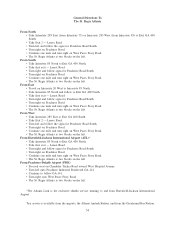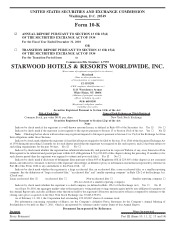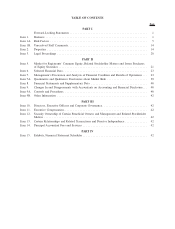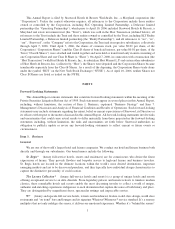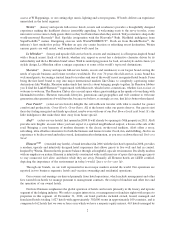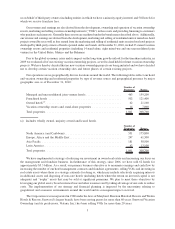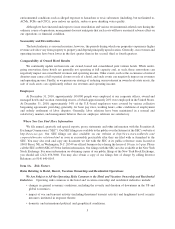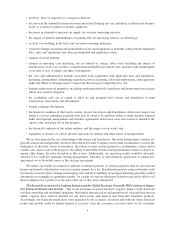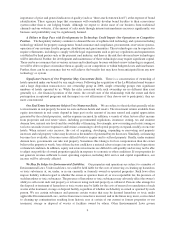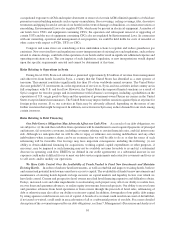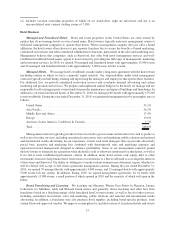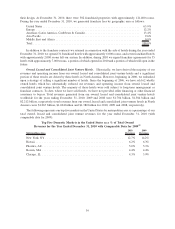Starwood 2010 Annual Report Download - page 74
Download and view the complete annual report
Please find page 74 of the 2010 Starwood annual report below. You can navigate through the pages in the report by either clicking on the pages listed below, or by using the keyword search tool below to find specific information within the annual report.• travelers’ fears of exposures to contagious diseases;
• decreases in the demand for transient rooms and related lodging services, including a reduction in business
travel as a result of general economic conditions;
• decreases in demand or increases in supply for vacation ownership interests;
• the impact of internet intermediaries on pricing and our increasing reliance on technology;
• cyclical over-building in the hotel and vacation ownership industries;
• restrictive changes in zoning and similar land use laws and regulations or in health, safety and environmental
laws, rules and regulations and other governmental and regulatory action;
• changes in travel patterns;
• changes in operating costs including, but not limited to, energy, labor costs (including the impact of
unionization), food costs, workers’ compensation and health-care related costs, insurance and unanticipated
costs such as acts of nature and their consequences;
• the costs and administrative burdens associated with compliance with applicable laws and regulations,
including, among others, franchising, timeshare, privacy, licensing, labor and employment, and regulations
under the Office of Foreign Assets Control and the Foreign Corrupt Practices Act;
• disputes with owners of properties, including condominium hotels, franchisees and homeowner associations
which may result in litigation;
• the availability and cost of capital to allow us and potential hotel owners and franchisees to fund
construction, renovations and investments;
• foreign exchange fluctuations;
• the financial condition of third-party owners, project developers and franchisees, which may impact our
ability to recover indemnity payments that may be owed to us and their ability to fund amounts required
under development, management and franchise agreements and in most cases our recourse is limited to the
equity value said party has in the property;
• the financial condition of the airline industry and the impact on air travel; and
• regulation or taxation of carbon dioxide emissions by airlines and other forms of transportation.
We are also impacted by our relationships with owners and franchisees. Our hotel management contracts are
typically long-term arrangements, but most allow the hotel owner to replace us in certain circumstances, such as the
bankruptcy of the hotel owner or franchisee, the failure to meet certain financial or performance criteria and in
certain cases, upon a sale of the property. Our ability to meet these financial and performance criteria is subject to,
among other things, the risks described in this section. Additionally, our operating results would be adversely
affected if we could not maintain existing management, franchise or representation agreements or obtain new
agreements on as favorable terms as the existing agreements.
We utilize our brands in connection with the residential portions of certain properties that we develop and
license our brands to third parties to use in a similar manner for a fee. Residential properties using our brands could
become less attractive due to changes in mortgage rates and the availability of mortgage financing generally, market
absorption or oversupply in a particular market. As a result, we and our third party licensees may not be able to sell
these residences for a profit or at the prices that we or they have anticipated.
The Recent Recession in the Lodging Industry and the Global Economy Generally Will Continue to Impact
Our Financial Results and Growth. The recent economic recession has had a negative impact on the hotel and
vacation ownership and residential industries. Substantial increases in air and ground travel costs and decreases in
airline capacity have reduced demand for our hotel rooms and interval and fractional timeshare products.
Accordingly, our financial results have been impacted by the economic recession and both our future financial
results and growth could be further harmed if recovery from the economic recession slows or the economic
6




